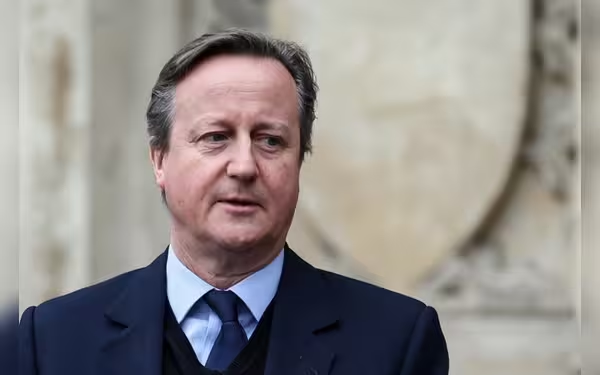Saturday, November 16, 2024 05:45 PM
UK Plans Sanctions on Israeli Ministers Amid Election Turmoil
- Cameron planned sanctions on extremist Israeli ministers.
- UK Foreign Secretary Lammy supports potential sanctions.
- Concerns over international law and arms sales to Israel.
 Image Credits: arabnewspk
Image Credits: arabnewspkDavid Cameron reveals plans for UK sanctions on extremist Israeli ministers amid election, emphasizing accountability and international law.
LONDON: The political landscape surrounding Israel and its government has recently come under scrutiny, particularly regarding the actions and statements of certain Israeli ministers. Former UK Foreign Secretary David Cameron revealed that he had plans to impose sanctions on what he termed "extremist" Israeli ministers, specifically Finance Minister Bezalel Smotrich and National Security Minister Itamar Ben-Gvir. These sanctions would have included asset freezes and travel bans, aimed at sending a clear message to Israeli Prime Minister Benjamin Netanyahu about the unacceptable conduct of his government.
Cameron, who served as foreign secretary until July, expressed his concerns during an interview with the BBC. He stated that he was "working up" these plans when Prime Minister Rishi Sunak called for a general election, which ultimately resulted in a loss for the Conservative Party. Cameron emphasized the need for the new Labour government to follow through with these sanctions, highlighting that the actions of Smotrich and Ben-Gvir, including their encouragement of extreme settlers in the West Bank and inflammatory rhetoric regarding Gaza, warranted a strong response.
In his remarks, Cameron pointed out that Ben-Gvir had made alarming statements, such as justifying the starvation of people in Gaza and advocating for the ethnic cleansing of Palestinians. He argued that sanctioning these ministers would demonstrate to Netanyahu that the UK is serious about holding his government accountable for its actions. Cameron noted that the plans for sanctions were well advanced but were ultimately shelved due to the political implications of such a move during an election period.
Current UK Foreign Secretary David Lammy has echoed Cameron's sentiments, describing the rhetoric of Smotrich and Ben-Gvir as "entirely unacceptable." He has indicated that the UK is closely monitoring the situation and is in discussions with G7 partners regarding potential sanctions. Lammy has also initiated a review of UK arms sale licenses to Israel, resulting in the suspension of 30 licenses due to concerns about their potential use in violating international law.
While Cameron has expressed concerns that arms export bans could limit Israel's ability to defend itself against threats from Iran and Hezbollah, he insists that the UK must balance its support for Israel's right to self-defense with the need for adherence to international law. He stated, "We do want to see aid get through to Gaza, and we do want the role of the UN in Lebanon to be respected." This highlights the complex nature of international relations, where support for an ally must be weighed against the moral implications of their actions.
Experts, such as Tom Keatinge from the Royal United Services Institute, have noted that sanctioning politicians from allied nations is unprecedented for the UK and could lead to significant diplomatic challenges. The situation remains delicate, as the UK navigates its relationships with both Israel and other international partners.
The potential for sanctions against Israeli ministers raises important questions about the balance of power, accountability, and the role of international law in global politics. As the UK government reassesses its stance, it is crucial to consider the broader implications of these actions, not only for Israel and Palestine but for international relations as a whole. The world watches closely, as the decisions made today will shape the future of diplomacy and conflict resolution in the region.













